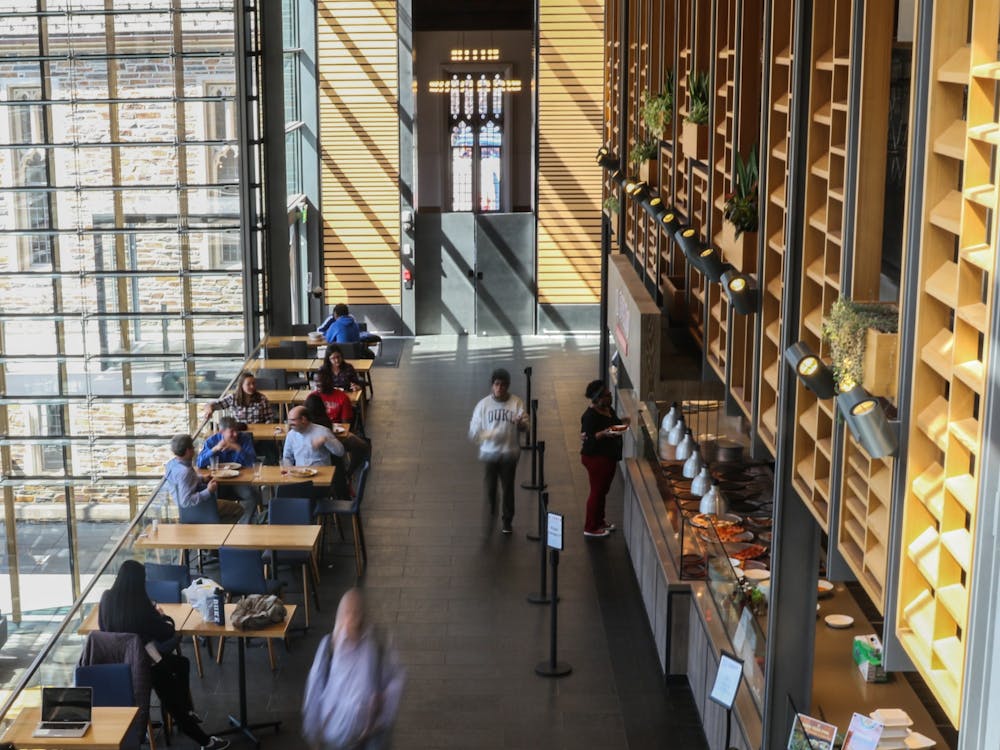What’s been going on with the Duke University Student Dining Advisory Committee?
Sophomore Taylor Glatt and senior Alix Rosenberg, co-chairs of DUSDAC, discussed the committee’s new structure, the reusable container program and mobile ordering issues.
Mobile ordering
Why are only certain venues available at certain times, and why are some items randomly unavailable?
As it turns out, the primary answer is staffing issues.
“It's almost all about staffing issues for the most part, like how Farmstead only has sandwiches [on mobile order],” Glatt said. “They don't have enough people to be running around.”
Glatt also noted that “supply chain issues” have made it difficult for Gyotaku and Devil’s Krafthouse to implement mobile ordering.
“It's not a requirement for the places to be on mobile order,” Glatt said. “They're doing that as, I guess, a choice. So if it gets busier, if they're dealing with so many people in line, then they have the ability to turn it off for themselves so that they can focus on the customers.”
Rosenberg further emphasized that the complaints DUSDAC has been receiving, involving long lines and wait times, are a product of this deeper issue of staffing and product shortages.
“It's not something that can be fixed overnight. It's not just something that's going on, on campus. It's something that's going on everywhere,” Rosenberg said. “So it's a bigger problem than us just telling them ‘Oh, there's a long line at Sazon today.’ It's deeper than that.”
These product shortages are the reason for the increase in prices—vendors have no choice but to raise costs if they wish to maintain their menu options.
Reusable container program
A major sustainability project in the works is the reusable container program in on-campus eateries.
“I think you have to sign up for the reusable container program, so it's not just going to be a general thing,” Rosenberg said. “You have to check it in and then check it out at every meal so they can keep track of it because there's been a lot of problems with people stealing stuff from [the Brodhead Center].”
Glatt explained that students will eventually be able to go up and ask for a reusable container, but because DUSDAC is “piloting” the program, the sign-up system is necessary for now.
“In terms of reusable utensils, they're working on getting all the main dining halls back into that,” Rosenberg said. “Right now they only have Divinity Cafe, The Commons and the Nasher for reusables, but they're waiting for the Brodhead, because those are smaller venues, so it’s easier for them.”
DUSDAC structure
On a brighter note, Glatt and Rosenberg shared that all the members within DUSDAC have been “super engaged” this year, and during the application process, they selected a small group of students that are “really passionate about it.”
Both had reasons of their own as to why they were initially drawn to the group.
“I just really love food,” Glatt said. “I found out about the club freshman year, so I applied and I've really enjoyed the work that we've been doing—getting to know all the insides about food at Duke and being able to share our input and our opinions.”
For Rosenberg, DUSDAC was “the perfect place for me to directly communicate with dining admin who I was already talking to, due to my allergies.”
“I have celiac, so I eat gluten free and dairy free. And so dining has always been a problem for me, I've always had a lot of trouble with food. And it's really hard to not have a voice if I'm having trouble with food,” Rosenberg said. “I came across this committee when I was a freshman and I was like, ‘This just seems perfect for me.’”
Rosenberg appreciated the fact that DUSDAC has been helpful in advocating for more options on campus, especially for those with allergies, and Duke Dining has been responsive to the group’s requests.
“It's cool how people come to us with their issues. My friends know ‘if I have an issue with food, I'm going to tell you’ and it's cool that I can actually do something about it,” Rosenberg said. “When I was a freshman, all of us hated that there were no clean vegetables on campus. In Marketplace, you could get your stuff from your salad, but there was no plain broccoli— everything always had some funky sauce. So I told them, ‘We want clean vegetables.’ Literally two days later they were there.”
This year, DUSDAC has been implementing a vendor liaison program where each student is paired with a vendor that they communicate with directly, providing each other with feedback, suggestions and questions, Rosenberg explained.
Each student is then placed on a subcommittee—composed of three undergraduates in total—where they focus on one main problem, including body positivity, social media marketing, environmental sustainability, Marketplace council or nutrition and allergies. Students are able to reside on multiple subcommittees if they so choose.
The group has been working closely with Marcus Cason, assistant director of sustainability and quality control, on his new sustainability and alignment group that involves student leaders from numerous Duke organizations.
Get The Chronicle straight to your inbox
Signup for our weekly newsletter. Cancel at any time.

Madeleine Berger is a Trinity senior and an editor at large of The Chronicle's 119th volume.

